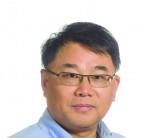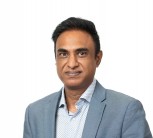The lecture gives an overview of the research activities of CNES which is a Centre of Excellence focused on energy efficiency research, service and development. It hosts the National Hub for the Postgraduate Programme in Energy Efficiency and Demand-side Management of which Prof Xia is the director, as well as the Exxaro Chair in Energy Efficiency. Prof Xia discusses energy efficiency and demand side management and poses the question whether this can still rescue the country from its energy predicament.
March 4, 2015


Professor Raj Naidoo completed his PhD in Electrical Engineering at the University of Cape Town in 2008 and has been doing research at the University of Pretoria (UP) since 2002.
Prof Naidoo leads smart grids research at UP and works closely with other members of the Power Group, which focuses on integrating renewable energy generation such as wind or photovoltaic power into traditional grids, and reducing inefficiency and emissions. This is at all levels, from small energy sources like a home photovoltaic cell to large sources like a wind energy farm.
He says his research allows him to help solve some of the world’s energy problems. “I’m also stimulated in my quest to solve problems and challenge myself in new ways,” Prof Naidoo says. “UP has world-class researchers and infrastructure, and it is a natural alignment for me to do my research at there.”
Some of the practical applications and opportunities for his research include renewable energy integration, energy management and advanced distribution management systems. UP’s Department of Electrical, Electronic and Computer Engineering, which Prof Naidoo heads, works closely with the South African National Energy Development Institute, Rand Water and the Department of Energy. The Department of Electrical, Electronic and Computer Engineering has established strong ties with the local municipality of the City of Tshwane. Together with these partners, Prof Naidoo and his team are paving the way for new approaches to solving Africa’s energy crisis.
His research matters because his department is helping to make the national grid safer, more stable and more efficient, guiding the integration of sustainable energy sources and improving the data available to engineers working on the grid. “Our research is also improving energy efficiency and reducing waste in homes, buildings and factories around South Africa and Africa,” he says. Discussions aimed at collaboration with various faculties are underway.
A recent highlight for Prof Naidoo has been the pioneering of research in smart electrical asset management. “Our research involves the application of smart grid technologies to improve asset management for utilities.”
Prof Naidoo is inspired by Albert Einstein, particularly his ability to derive the theory of relativity from first principles. He also admires Tesla’s work in reshaping various sectors.
Prof Naidoo hopes to create technology that will power sustainable communities in Africa, given that electricity is a challenge for many on the continent.
To school learners or undergraduates who have an interest in solving the world’s energy crisis, he says electrical engineering is for them.
In his spare time, Prof Naidoo enjoys watching and playing football, hiking and being involved in product development.
 Story
Story
This edition is curated around the concept of One Health, in which the University of Pretoria plays a leading role globally, and is based on our research expertise in the various disciplines across healthcare for people, the environment and animals.
 Story
Story
Paediatric neurosurgeon Professor Llewellyn Padayachy, Head of the Department of Neurosurgery at the University of Pretoria’s (UP) Steve Biko Academic Hospital, is redefining how brain-related diseases are diagnosed and treated, especially in low-resource settings. He’s at the forefront of pioneering work in non-invasive techniques to assess and measure raised pressure inside the skull,...
 Infographic
Infographic
Africa faces immense challenges in neurosurgery, such as severe underfunding, a lack of training positions and a high burden of disease. There is one neurosurgeon per four million people, far below the WHO’s recommendation of one per 200 000. This shortage, compounded by the lack of a central brain tumour registry and limited access to diagnostics, severely impacts patient outcomes.
Copyright © University of Pretoria 2025. All rights reserved.
Get Social With Us
Download the UP Mobile App